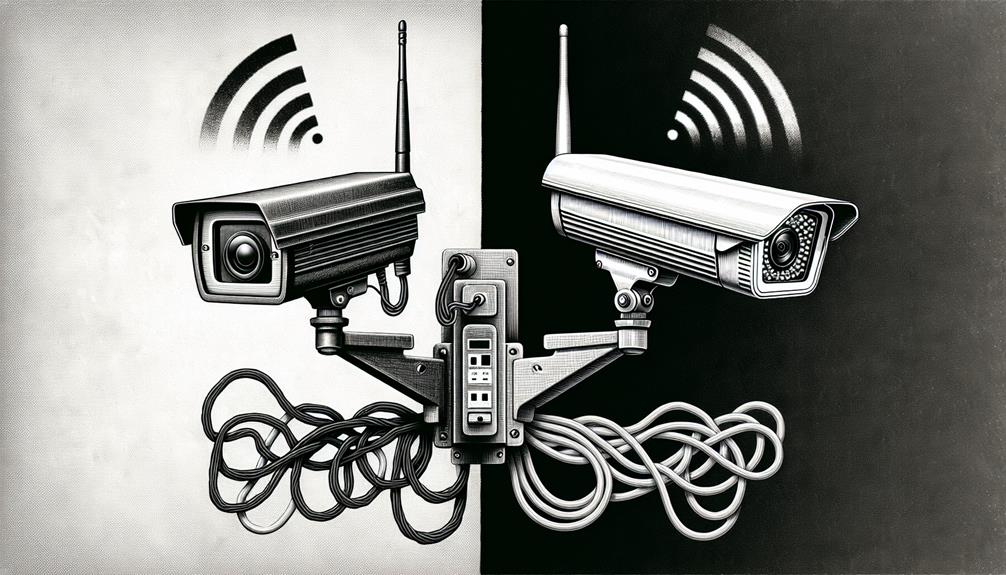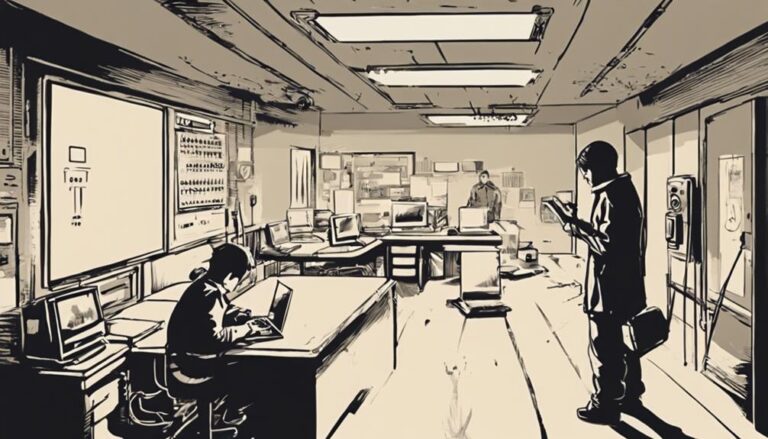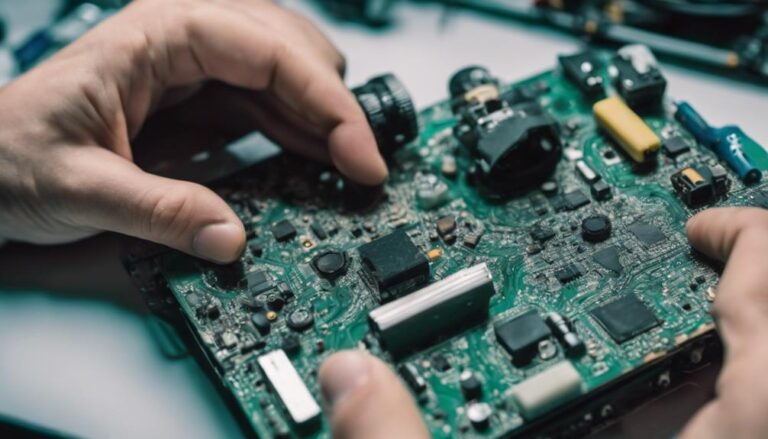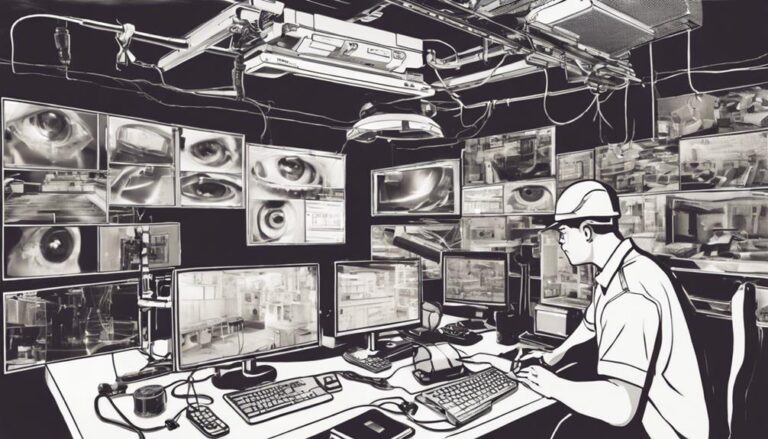When choosing between wired and wireless CCTV systems, consider several factors. Wired systems need more effort to install but offer stable connections and clearer footage. They’re less prone to interference but can be costly upfront. Wireless systems are easier to install and more flexible but may suffer from signal drops and interference. They’re cheaper initially but might incur ongoing costs, like battery replacements. For long-term use, wired systems often save more money, but wireless ones excel in fast and easy setup. Both have unique security benefits, suiting different needs. There’s more to explore if you’re weighing options.
Installation Process
Installing a wired CCTV system often requires more effort and time compared to a wireless one. You’ll need to run cables throughout your property, which can be a hassle. Drilling holes, threading cables through walls, and connecting everything to a central recording device takes dedication. If you’re someone who values your time and doesn’t want to be tied down by complex installations, this might not be the best route for you.
On the other hand, setting up a wireless CCTV system is quicker and less cumbersome. You won’t have to worry about running cables or finding ways to hide them. You can place the cameras wherever you want without being restricted by cable lengths. This gives you the freedom to change camera locations easily if you decide to rearrange your space or move to a new place.
However, you should still consider the power source for the wireless cameras, as many still require a connection to an outlet. But overall, the wireless setup offers more flexibility and a quicker installation process, allowing you to get your surveillance system up and running without feeling trapped by extensive wiring tasks.
Reliability and Performance
When it comes to reliability and performance, wired CCTV systems generally offer a more stable connection and higher quality footage. You won’t have to worry about interference from other devices or signal drops, which means your surveillance will run smoothly without interruptions.
Wired systems also usually provide higher resolution video, which is important if you want clear and detailed footage. This can be particularly significant if you’re using CCTV for security purposes and need to identify faces or license plates.
On the other hand, wireless CCTV systems offer you the freedom to install cameras without the hassle of running wires. However, they can be more susceptible to interference from other wireless devices and even weather conditions. This could result in choppy video or lost connections, which isn’t ideal when you need consistent surveillance.
Here are some points to keep in mind:
- Stability: Wired systems are less likely to experience signal interruptions.
- Quality: Expect higher resolution and clearer footage with wired systems.
- Interference: Wireless systems can suffer from interference and signal drops.
Ultimately, your choice will depend on your specific needs and how much you value stability and quality over installation flexibility.
Cost Comparison
Comparing the costs of wired and wireless CCTV systems reveals significant differences that can impact your decision. Wired systems often come with higher upfront costs due to the need for extensive cabling and professional installation. You’ll have to factor in the price of cables, labor, and sometimes even structural modifications to route the wires properly. However, once installed, wired systems usually have lower maintenance costs and fewer issues related to connectivity.
On the other hand, wireless systems are generally easier and cheaper to install, making them an attractive option if you value quick setup and minimal disruption. You won’t need to worry about cables snaking through your walls or hiring professionals for installation. While the initial cost might be lower, be aware that you may incur higher ongoing costs. These can include battery replacements, potential interference issues, and sometimes more expensive hardware to guarantee a stable connection.
Ultimately, your choice between wired and wireless CCTV depends on your personal priorities. If you’re looking for a quick, easy, and flexible solution, a wireless system might be your best bet. However, if you prefer long-term savings and don’t mind the initial investment, a wired system could offer more reliability.
Security Features
Beyond cost, security features play a pivotal role in determining whether a wired or wireless CCTV system is right for you. When it comes to wired systems, they offer robust security due to their physical connections that are harder to tamper with. Hackers find it more challenging to breach these systems since they don’t rely on wireless signals.
Wireless systems, on the other hand, provide a different set of advantages. They often come with advanced encryption protocols to secure the data being transmitted. Plus, they offer the flexibility of remote access, which means you can monitor your property from anywhere, giving you a sense of freedom and control.
Consider these key security features:
- Tamper Resistance: Wired systems are less prone to interference and physical tampering.
- Data Encryption: Wireless systems use high-level encryption to protect your footage from unauthorized access.
- Remote Monitoring: Wireless systems allow you to check in on your property from anywhere, anytime.
Ultimately, the choice depends on your specific needs and how you prioritize these security features. Whether you prefer the hard-to-breach nature of wired systems or the advanced tech of wireless ones, both have their unique strengths to offer.
Maintenance Requirements
Maintaining a CCTV system involves distinct requirements depending on whether you choose a wired or wireless setup. If you go wired, you’re looking at a more stable connection but also more physical upkeep. You’ll need to regularly inspect the cables for wear and tear, especially in harsh environments. Damaged cables can disrupt your entire surveillance network, which means you might find yourself troubleshooting and replacing parts more often than you’d like.
On the flip side, wireless systems offer you the freedom to place cameras without worrying about running cables through walls or ceilings. However, they come with their own set of challenges. You’ll need to keep an eye on battery life and make sure your cameras stay charged. Regularly updating firmware is important to keep your system secure and functioning smoothly. Wireless signals can sometimes get interrupted, so you might need to occasionally adjust the placement to maintain a strong connection.
Both options require a bit of vigilance, but they cater to different needs and lifestyles. If you value stability and don’t mind the physical maintenance, go wired. If you prefer flexibility and can handle tech updates, wireless is your best bet.
Scalability and Flexibility
When it comes to scalability and flexibility, choosing between a wired and wireless CCTV system can have a significant impact on how easily you can expand and adapt your surveillance network. If you value freedom and adaptability, a wireless system might be more appealing. Wireless CCTV systems offer you the ease of adding cameras without the hassle of running new cables through walls and ceilings. You can also relocate cameras with minimal effort, making it ideal for dynamic environments where surveillance needs may change frequently.
On the other hand, wired systems offer stability and consistency, important for larger setups where interference and signal loss could be problematic. Expanding a wired system, though, often requires professional assistance and can be more time-consuming due to the need for additional cabling and possible structural modifications.
Consider these points:
- Ease of Expansion: Wireless systems let you add cameras effortlessly, while wired setups may need more planning and labor.
- Relocation Flexibility: Wireless cameras can be moved as your needs change, offering more adaptability than their wired counterparts.
- Signal Reliability: Wired systems provide a stable, interference-free connection, essential for large-scale installations.
Choosing the right system depends on your specific needs for scalability and flexibility.
Frequently Asked Questions
What Are the Aesthetic Differences Between Wired and Wireless CCTV Systems?
The main aesthetic difference is that wired systems have visible cables, making them less sleek. Wireless systems offer a cleaner look with fewer cables, giving you more freedom to maintain your space’s visual appeal.
How Do Environmental Factors Affect Wired Versus Wireless CCTV Systems?
Environmental factors like weather and terrain can disrupt wireless signals but won’t affect wired systems. However, wired systems are vulnerable to physical damage. You need to weigh reliability against flexibility and freedom for your specific needs.
Can Wired and Wireless CCTV Systems Be Integrated Together?
You can definitely integrate wired and wireless CCTV systems. By using a hybrid DVR or NVR, you’ll enjoy the flexibility and freedom to mix both types, ensuring thorough coverage and adaptability for your security needs.
What Are the User Interface Differences Between Wired and Wireless Systems?
You’ll find wired systems often have more complex interfaces, requiring direct connections and more setup time. Wireless systems, on the other hand, usually offer user-friendly apps, giving you the freedom to monitor from anywhere.
How Do Wired and Wireless Systems Impact Internet Bandwidth Usage?
Imagine your internet as a highway. Wireless systems can clog it with heavy traffic, consuming more bandwidth. Wired systems, however, keep the lanes clear, using minimal bandwidth and ensuring a smoother online experience for your devices.



